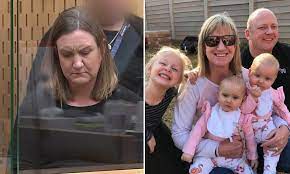Lauren Dickason told a psychologist she thought killing her three little girls would be “a happy ending for everyone” after the family made the “huge mistake” of emigrating to New Zealand.
Her world was “falling apart” and she was “unravelling”, and she was convinced death for her and her children was the only way out of a “helpless and hopeless” situation.
And he says while the killings were brutal, callous, determined and deliberate – Dickason cannot be held criminally responsible.
“I do not consider that Miss Dickason’s mental state at the time of the alleged offending precluded her from understanding the nature and quality of the acts,” said forensic psychologist Ghazi Metoui.
“To the contrary, I consider that she was purposeful and deliberate throughout her offending and acted with full conscious awareness of her actions and with great determination to pursue her aim, the killing of her three young children.
“However, such was the severity of her depressive illness and associated distorted thinking at that time … that ultimately, she thought she and her three children were better off dead.
“It is my opinion that she did not know that the alleged acts were morally wrong to the commonly accepted standard of right and wrong … she has a defence of insanity.”
The final witness is today giving evidence in the trial of Lauren Dickason, the woman accused of murdering her three little girls at their Timaru home.
But the trial will not end until at least next week.
This morning, Justice Cameron Mander at the High Court in Christchurch told the jury of eight men and four women the last witness will be on the stand for the rest of today and likely much of tomorrow.
It is expected the Crown and defence will give final closing addresses on Friday and Justice Mander will sum up the entire trial for the jury on Monday before giving them instructions and sending them to deliberate.
